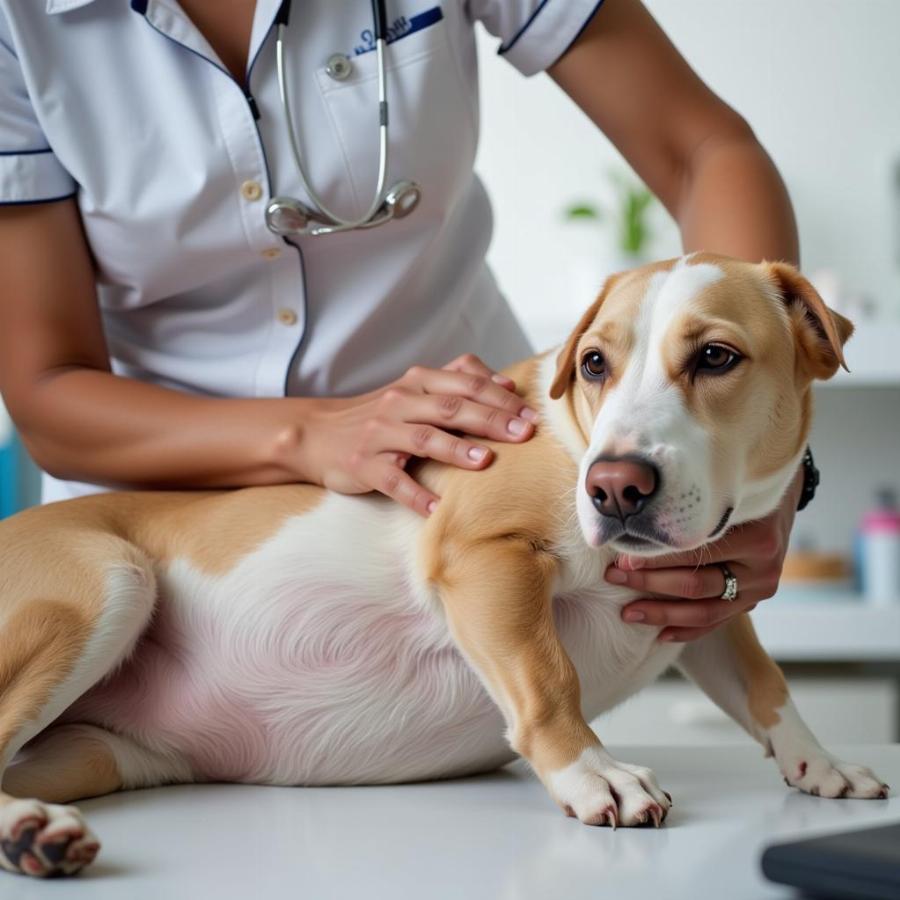Dealing with bad dog farts? You’re not alone! Many dog owners experience the occasional (or frequent) waft of unpleasant canine flatulence. While some dog farts are simply an unavoidable part of dog ownership, excessively smelly or frequent gas can indicate underlying dietary issues or even medical conditions. This comprehensive guide will explore the common causes of bad dog farts, offer practical solutions to reduce their frequency and odor, and help you determine when it’s time to seek veterinary advice.
What Causes Those Stinky Dog Farts?
Just like humans, dogs produce gas as a byproduct of digestion. A number of factors can contribute to the development and odor of this gas, including diet, gut health, and even the way they eat. Let’s delve into the most common culprits.
Diet Plays a Key Role
The food your dog eats has a significant impact on their digestive health and, consequently, their gas. Certain ingredients can be more difficult for dogs to digest, leading to increased gas production and a stronger odor. High-fiber diets, while generally healthy, can sometimes contribute to flatulence. Similarly, foods high in fat or protein can also be culprits. Additives, fillers, and artificial ingredients in low-quality dog food can also disrupt a dog’s digestive system and lead to smelly gas.
Gulping Air and Eating Too Fast
Dogs that gobble down their food quickly often swallow excessive amounts of air, which can contribute to gas buildup. This is particularly true for brachycephalic breeds (dogs with short noses, like Bulldogs and Pugs), who tend to gulp air more readily. Even the shape of their food bowls can influence how much air they ingest.
Food Intolerances and Allergies
Just like people, dogs can develop intolerances or allergies to certain foods. These reactions can manifest in various ways, including excessive gas, diarrhea, and vomiting. Common food allergens for dogs include beef, dairy, wheat, and chicken.
Medical Conditions
In some cases, excessive or unusually foul-smelling gas can be a symptom of an underlying medical condition. Conditions such as inflammatory bowel disease (IBD), intestinal parasites, and pancreatic insufficiency can all contribute to digestive problems and increased gas.
How Can I Reduce My Dog’s Flatulence?
Fortunately, there are several steps you can take to address your dog’s smelly farts.
Dietary Changes
Switching to a high-quality dog food formulated for sensitive stomachs can make a noticeable difference. Look for foods that contain easily digestible ingredients and avoid those with excessive fillers or artificial additives. You can also try gradually introducing new foods to identify potential triggers.
Slow Down Mealtimes
If your dog tends to inhale their food, try using a slow-feeder bowl or puzzle toys to encourage them to eat more slowly. This can help reduce the amount of air they swallow.
Probiotics and Digestive Enzymes
Adding probiotics or digestive enzymes to your dog’s diet can help support their gut health and improve digestion, which can, in turn, reduce gas.
When to See a Vet
While occasional gas is normal, persistent, excessive, or foul-smelling flatulence warrants a visit to the veterinarian. They can help determine the underlying cause and recommend appropriate treatment.
What if my dog’s farts are suddenly worse?
A sudden increase in gas or a significant change in its odor can indicate a dietary indiscretion or a developing health issue. Consult your veterinarian.
Are there any over-the-counter remedies for dog farts?
While some over-the-counter remedies are available, it’s always best to consult your veterinarian before giving your dog any new supplements or medications.
Can certain breeds be more prone to gas?
Brachycephalic breeds are often more prone to gas due to their tendency to gulp air.
 Veterinarian examining a dog
Veterinarian examining a dog
How does exercise affect dog farts?
Regular exercise can help stimulate digestion and reduce gas buildup.
What should I feed my dog to reduce gas?
A high-quality, easily digestible diet is key. Look for foods with limited fillers and artificial ingredients.
Conclusion
Bad dog farts, while often a source of amusement, can also be a sign of something more serious. By understanding the common causes and implementing the tips outlined in this article, you can help your furry friend enjoy a healthier, less gassy life. Remember, if you have concerns about your dog’s digestive health, consult your veterinarian for professional advice. Addressing the issue promptly can help ensure your dog’s overall well-being.
Beaut Dogs is your go-to resource for all things canine, providing reliable and expert information on the world of dogs. We offer comprehensive guidance on breed characteristics, care, and much more. When you need support, reach out to us at Email: [email protected] for detailed and accurate answers from Beaut Dogs.